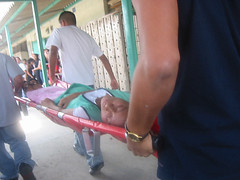The interviews have begun! A while ago, actually. We’ve been so busy and in such intimate contact with the workers that we haven’t had time to write up a blog entry. But here we are!
First of all, the black list is a HUGE concern of the workers. Not only have Cimatextiles workers and Sitracima members been turned away from employment at other factories, but they have told us of their spouses being turned away as well. The effect of the black list on worker morale is devastating, and they desperately want to work but will be unable to find it in any other maquila. Villa Nueva (the city where the factory is and where the workers live) is dominated by maquilas, therefore the black list is a large barrier for anyone from Cimatextiles looking for work elsewhere.
Also, some workers report that when they apply at other factories, they face gruelling and humiliating inspections in which they must strip naked to be searched for tattoos or other “undesirable traits”. At these non-unionized maquilas they face racial and sexual slurs, abuse, and other violations of their dignity.
Back to Cimatextiles: From the time of the formation of their union, Sitracima, management has used anti-union tactics to gain the support of unorganized workers who feared union affiliation. These non-unionized workers are now being given preference by management and are called upon to continue work at the supposedly closed factory. In addition, employees of Choi Shin, the neighboring sister factory, are secretly working in Cimatextiles. So much for “closed for remodelling!”
Cimatextiles has been undergoing renovation during this “closure.” By building a wall around the cafeteria where workers eat, and installing industrial washing machines, management is expanding operations at Cimatextiles. We fear Cimatextiles is making these changes with the intention to register with the Guatemalan government under a different name, thereby changing the legal status of the factory. This action could nullify the legally binding agreement which requires the rehire of union workers when the factory is scheduled to reopen on September 1. Bottom line: Cimatextiles is doing what it can to avoid hiring unionized workers.
This is in direct contradiction to information given to the workers by management, who state the reason for closure is that there is no work. There is some truth to this: Liz Claiborne is no longer producing at Cimatextiles. Instead, Liz Claiborne is now producing at a factory in Nicaragua owned by the same company. That’s right: Liz Claiborne ditched Cimatextiles in favor of non-union labor!
Despite these manipulations by management, the workers of Cimatextiles repeatedly say: we want this job. Work is better at a unionized Cimatextiles than at any of the other sweatshop in Villa Nueva!
¡Viva Sitracima! ¡Viva Sitrachoi!
fauxhawk trio
Saturday, August 18, 2007
Subscribe to:
Post Comments (Atom)
Introduction
The workers at the Guatemalan factory CimaTextiles formed a union in 2001. They won a collective bargaining agreement in 2003, and since then have struggled to protect their gains. The corporation which owns the factory, Choi & Shin Co., Inc., consistently tries to break the union's back, and has since its inception. etc. etc. Here is the union's wiki. Here are the pictures from the protest. Here is the urgent action.
This section is under construction. Thank you for your patience.
This section is under construction. Thank you for your patience.

No comments:
Post a Comment